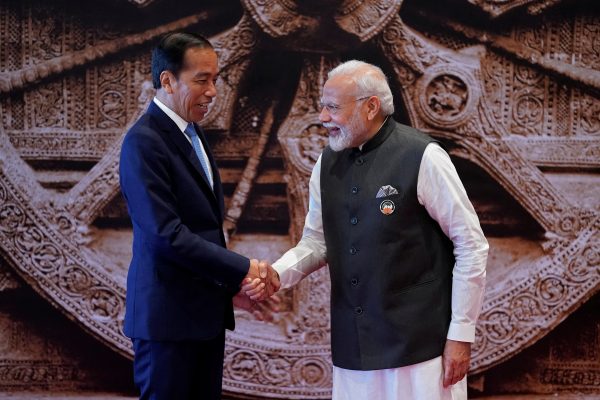According to the World Intellectual Property Organization Global Innovation Index 2023, India has moved up in its ranking from 48th to 40th position since 2020, with Indonesia moving from 85th to 61st position in the same timeframe.
Both countries are recognised for their vibrant entrepreneurship culture and funding availability for start-ups and scaleups. But their weaknesses include a limited circulation of talent and — in India’s case — limited participation of women with advanced degrees in the labour market.
The increased performance of India and Indonesia reflects a broader change in the global innovation landscape. New innovation and entrepreneurship hotspots have emerged outside developed economies, with many across Asia. Until the beginning of the 2000s, OECD countries accounted for more than 95 per cent of global patenting activity. But this share has progressively decreased, dropping to 76 per cent in 2019.
The changing geography of innovation is largely due to the emergence of China as a leading global technology and innovation hub. Between 2000 and 2018, while the research and development investment share in GDP for OECD countries remained relatively stable at between 2.2 per cent to 2.4 per cent, it more than doubled in China — increasing from less than 1 per cent to 2 per cent.
But new players are emerging in certain sectors and technologies. In fintech, for example, the Indian government has taken the lead by building a public digital infrastructure through which private sector actors can innovate and develop new solutions.
A leading example is India’s Unified Payments Interface (UPI), a real-time payment system allowing users to instantly transfer money through mobile phones. Since its launch in 2016, UPI has grown steadily, recording more than nine billion transactions worth Rs 14 lakh crore (US$169 billion) in May 2023 alone.
UPI has been instrumental in fostering financial inclusion in rural India where large sections of the population do not have access to traditional bank accounts. UPI is not only growing domestically but is increasingly used for cross-border payments, with countries across Asia, the Middle East and Europe adopting or planning to adopt the system.
In Indonesia, disruptive start-ups are the primary driver of fintech development and adoption. Thanks to a young and tech-savvy population, digital ride-hailing services — such as Indonesia-based GoTo — have rapidly diversified into financial transactions. They are now further expanding into additional services, such as consumer loans, retail investments and insurance.
Similar to India, these apps not only disrupt the market by offering innovative solutions but also tap into large groups of new consumers — the ‘unbanked population’. These are people who cannot open traditional bank accounts because they hold informal jobs, have no regular address or struggle with credit assessment.
These phenomena are not unique to Asia and are also found in Africa and Latin America.
Given this evolving tech landscape, policymakers in emerging Asian economies are increasingly putting innovation and entrepreneurship at the centre of national, regional or even global policy agendas. During Indonesia’s 2022 G20 presidency, it continued the G20 start-up competition developed by Italy, the 2021 G20 President.
Dubbed the G20 Digital Innovation Network, it gave emerging entrepreneurs the chance to meet investors, business sector leaders and ecosystem builders from other G20 nations. As the world was just emerging from over two years of the COVID-19 pandemic, the emphasis was put on innovations for post-pandemic recovery.
Priority sectors included healthcare, green and renewable energy, education technology, financial inclusivity and supply chains. Both healthcare and education technology have been boosted by the various mobility restrictions during the COVID-19 pandemic. Supply chains were heavily disrupted and green tech and fintech had been identified as important drivers of an inclusive, global post-pandemic recovery.
During its 2023 G20 Presidency, India scaled up Indonesia’s efforts to promote innovation and entrepreneurship ecosystems further. India announced the establishment of a new G20 engagement group — the Startup20 — entirely dedicated to start-up creation, innovation and entrepreneurship.
Startup20 emphasises the building blocks of innovation ecosystems, such as access to finance and the development of global networks of talents, mentors and idea circulation. It also highlighted the importance of innovative solutions to meet Sustainable Development Goals (SDGs), especially through the work of several task forces.
The Startup20 Sustainability Task Force focuses on skills development and enabling conditions for green innovations and SDG-focused start-ups. The Inclusion Task Force focuses on innovative solutions for supporting start-up founders from under-represented individuals, such as women, people with disabilities, the LGBTQIA+ community and grassroots communities. Startup20’s work was acknowledged by the September 2023 G20 New Delhi Leaders’ Declaration.
Indonesia and India’s efforts to promote inclusive and sustainable entrepreneurship and innovation are a direct consequence of the changing geography of innovation.
These dynamics are unlocking new opportunities to create global networks of investors, entrepreneurs and ecosystem builders spanning developed and developing countries to promote economic growth, accelerate inclusive innovation and foster the green transition.
Giulia Ajmone Marsan is the Director of Strategy and Partnerships at the Economic Research Institute for ASEAN and East Asia (ERIA).

